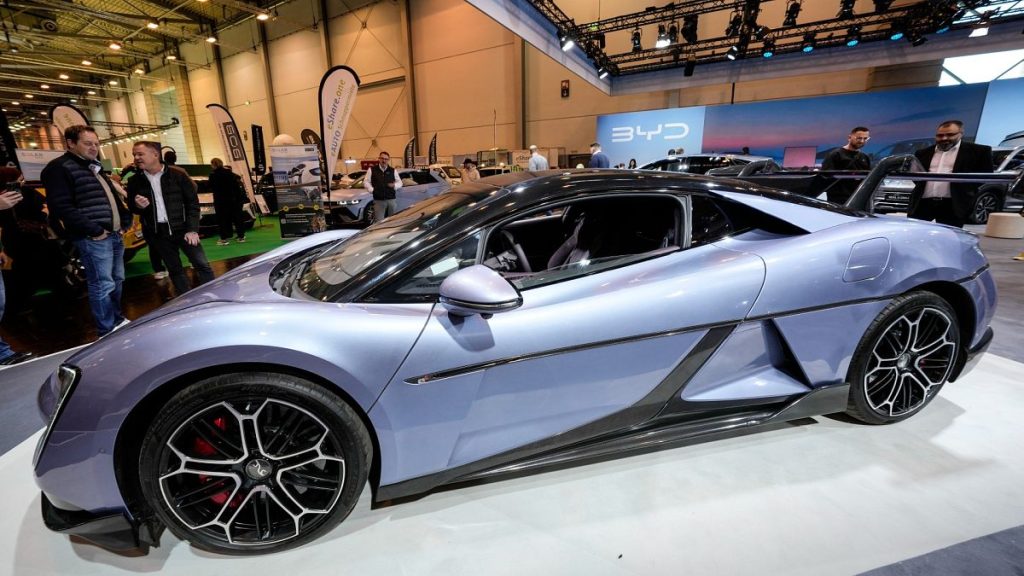BYD’s Ascent: A Chinese EV Giant on the Rise
BYD, a leading Chinese electric vehicle (EV) manufacturer, is experiencing remarkable growth, propelled by robust sales figures in its domestic market and expanding global presence. The company is on track to surpass its ambitious 2024 sales target of four million units, potentially outselling established automakers like Honda and Ford. This impressive performance is driven by several factors, including the Chinese government’s support for trade-ins, the company’s competitive pricing, and the increasing global demand for affordable EVs. BYD’s success story, however, is not without its challenges, as the company navigates trade tensions, brand recognition hurdles, and quality control concerns.
BYD’s sales surge is largely attributed to a significant increase in plug-in hybrid vehicle sales, which have grown by nearly 70% compared to the same period in 2023. This growth has been further fueled by the Chinese government’s initiatives to stimulate the auto market, including subsidies for car trade-ins. These measures aim to boost consumer spending and bolster the overall economy. As of November 2024, BYD has sold over 3.7 million vehicles, a 40% year-over-year increase, putting it within striking distance of its four million unit target. This performance contrasts with the sales figures of competitors like Ford and Honda, who have sold approximately 3.3 million and 3.11 million units, respectively, during the same period.
BYD’s ascendance in the Chinese market has come at the expense of other automakers, including Tesla, which has witnessed declining sales in China as it loses market share to BYD. Furthermore, several foreign car manufacturers, including Stellantis, Honda, Toyota, and Nissan, have struggled in the Chinese market, leading to factory closures and job cuts as they grapple with the transition away from traditional combustion engine vehicles. Volkswagen has also scaled back its operations in China, further consolidating BYD’s position in the market. This shift in the automotive landscape highlights the growing dominance of Chinese EV manufacturers in their home market.
Beyond China, BYD is steadily expanding its global footprint. The company has gained market share in Europe, as well as in countries like Thailand, Japan, and Mexico. BYD’s attractive pricing compared to European models, coupled with sleek designs and a range of features, has contributed to its growing popularity. The company, along with other Chinese automakers like Geely and SAIC, has made significant strides in improving vehicle quality, enhancing safety features, and addressing past quality concerns. This focus on quality has been instrumental in building consumer trust and driving sales.
The global rise in the cost of living has further fueled demand for affordable EVs, playing into BYD’s strengths. Consumers seeking to transition to electric mobility are increasingly drawn to BYD’s competitive pricing, which offers a more accessible entry point into the EV market. This trend positions BYD favorably for continued growth, particularly as consumers prioritize affordability in the face of economic pressures.
Despite its successes, BYD faces several challenges that could impede its growth trajectory. The European Union’s imposition of higher tariffs on imported Chinese EVs, in response to allegations of government subsidies, presents a significant hurdle. These tariffs, totaling 27% (17% additional + 10% standard), increase the cost of BYD vehicles for European consumers, potentially undermining the company’s competitiveness in the region. Furthermore, BYD’s brand recognition in Western markets remains relatively low, posing a challenge in attracting customers who may prefer established brands.
Another obstacle for BYD is the pricing of its offerings, which, in some cases, are only marginally lower than those of established competitors like Volkswagen. This narrow price difference may not always be sufficient to sway consumers towards BYD, particularly in markets where brand loyalty is strong. Furthermore, ongoing geopolitical tensions between China and the West, particularly with the EU and the US, have raised concerns about supply chain disruptions in the event of escalating trade wars. This adds a layer of uncertainty to BYD’s operations and could impact its ability to meet demand in international markets.
Finally, while BYD has made significant improvements in vehicle quality, some concerns persist regarding software issues and overall quality control. Addressing these concerns effectively is crucial for BYD to maintain its growth momentum and build long-term consumer trust. The company’s ability to navigate these challenges will ultimately determine its long-term success in the increasingly competitive global EV market. Despite these hurdles, BYD’s current trajectory suggests a bright future for the Chinese EV giant, as it continues to capitalize on the growing global demand for affordable and technologically advanced electric vehicles.














